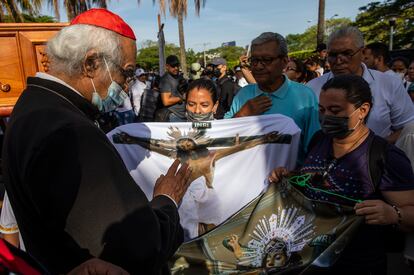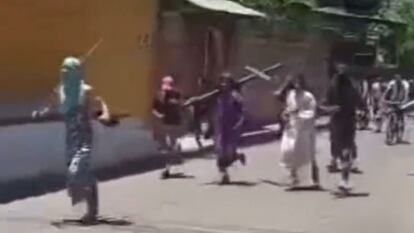Ortega regime steps up religious persecution of Catholics during Holy Week
The Nicaraguan leadership banned processions and other traditions during Easter with the police presence redoubled ahead of the April 18 fifth anniversary of widespread social protests


The religious persecution that the regime of Daniel Ortega and Rosario Murillo has been carrying out throughout April, and which intensified in its scale during Easter week when the police prohibited processions and other Catholic traditions in public spaces, has led to the detention of at least 20 Nicaraguans. The data on the arrests has been provided by opponents of the Ortega government, which have classified them as “kidnappings” after security forces laid siege to places of worship. The Blue and White National Unity (UNAB), an opposition organization founded in 2018, reported 35 instances of human rights violations during Holy Week, including five cases of police harassment and nine incidents of officers forcefully breaking up processions. These pressure groups also highlighted the deportation of Panamanian priest Donaciano Alarcón, who was left barefoot on the border with Honduras by immigration authorities after calling for the release of Bishop Rolando Álvarez, who refused exile along with 222 political prisoners expelled by Ortega in February and was subsequently sentenced to 26 years in prison.
The UNAB reported the arrests of nine parishioners participating in Holy Week activities and the detention of journalist Víctor Ticay, a contributor to terrestrial broadcaster Canal 10, who was covering the tradition of La Reseña in the municipality of Nandaime in southern Nicaragua. The event gained national relevance when devotees circumvented the ring of police officers attempting to prevent it. Ticay posted the chain of events on his Facebook page and was later arrested and the video he had broadcast was deleted from his social media.
The association Independent Journalists and Communicators of Nicaragua (PCIN) denounced Ticay’s arrest as “arbitrary and illegal” and reported that he was transferred to the Directorate of Judicial Assistance in Managua. However, the authorities have so far not made any comment on the journalist’s detention.
The Ortega and Murillo regime prohibited Catholics from performing the Stations of the Cross during the mid-February observance of Lent, and later extended the ban to all Holy Week events. The Catholic hierarchy in Nicaragua complied with the order and canceled the traditional national pilgrimages held before Holy Week. Parish priests ordered the faithful to carry out their acts of worship inside churches, but that did not prevent police harassment of devotees.
However, it was not only in Nandaime where acts of rebellion occurred. In the departments of Masaya, Granada, and Chinandega, young men dressed in robes and carrying crosses defied officials by recreating the passion, death, and resurrection of Christ in the streets. In the small municipality of Ranchería, in the west of the country, Catholic worshipers confronted riot police attempting to prevent a religious procession.

Pope Francis prays for Nicaraguan Catholics
Pope Francis referenced the crackdown on Catholic traditions in Nicaragua during his Urbi et Orbi Easter blessing. The pontiff spoke of the conflicts around the world and prayed for all those who are prevented from freely and publicly professing their faith. “Sustain, Lord, the Christian communities that today celebrate Easter in particular circumstances, as in Nicaragua and Eritrea,” Francis said.
The religious persecution in Nicaragua has intensified after Pope Francis expressed his “sadness and concern” over Bishop Álvarez and described the government as a “gross dictatorship,” which led the Sandinista regime to suspend diplomatic relations with the Vatican. In mid-March, the chargé d’affaires of the Holy See in Managua, Marcel Diouf, left Nicaragua and closed the nunciature. The Ortega and Murillo regime has shut down Catholic media outlets and expelled priests and nuns.
Urnas Abiertas, an independent electoral monitoring association, stated that the religious persecution during Holy Week was more pronounced and extended across almost the entire country. It also foresees little change in the policy throughout the month of April, particularly around April 18, which marks the fifth anniversary of the social protests that briefly shook the regime and led Ortega to ban political demonstrations a few months later.
Since those widespread protests, Ortega has redoubled the police presence during April to avoid any repetition or commemoration of the popular movement that was brutally suppressed by police and paramilitaries, resulting in the deaths of at least 355 people, according to the Inter-American Commission on Human Rights. Thousands more were arrested and hundreds convicted in political trials, while to date some 300,000 Nicaraguans have fled the country or gone into exile to escape political persecution and the economic crisis. It is an exodus only comparable to that of the 1980s, when the country was mired in a civil war.
A recent report produced by the UN Group of Human Rights Experts on Nicaragua (GHREN) concluded that Ortega and Murillo are responsible for committing crimes against humanity from 2018 to date and urged the international community to activate international justice mechanisms against the presidential couple. GHREN’s mandate has been renewed to delve deeper into repressive chains of command, including an investigation into the role of the Nicaraguan Army.
In exile in Miami, the auxiliary bishop of Managua, Silvio Báez, celebrated the Mass of Resurrection and recalled that the stones of the tomb were removed by Jesus. “On the road to their liberation the peoples are blocked not only by the huge stones of the cruelty of tyrants, but also by the stones of the indifference of the selfish, envy among leaders and the hopelessness of people tired of suffering. But all these stones can be removed,” the prelate said.
Sign up for our weekly newsletter to get more English-language news coverage from EL PAÍS USA Edition
Tu suscripción se está usando en otro dispositivo
¿Quieres añadir otro usuario a tu suscripción?
Si continúas leyendo en este dispositivo, no se podrá leer en el otro.
FlechaTu suscripción se está usando en otro dispositivo y solo puedes acceder a EL PAÍS desde un dispositivo a la vez.
Si quieres compartir tu cuenta, cambia tu suscripción a la modalidad Premium, así podrás añadir otro usuario. Cada uno accederá con su propia cuenta de email, lo que os permitirá personalizar vuestra experiencia en EL PAÍS.
¿Tienes una suscripción de empresa? Accede aquí para contratar más cuentas.
En el caso de no saber quién está usando tu cuenta, te recomendamos cambiar tu contraseña aquí.
Si decides continuar compartiendo tu cuenta, este mensaje se mostrará en tu dispositivo y en el de la otra persona que está usando tu cuenta de forma indefinida, afectando a tu experiencia de lectura. Puedes consultar aquí los términos y condiciones de la suscripción digital.








































